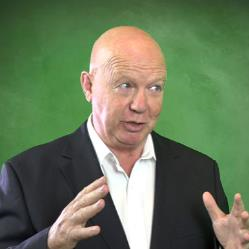
"Sales planning is an essential skill for sales managers" - Interview by John Smibert
 A team of any sort need a clear and simple plan that lays out the path to success. Sales teams are no different - they need a plan that ensures all team members know what is expected of them and how the activity of each team member fulfils the whole.
A team of any sort need a clear and simple plan that lays out the path to success. Sales teams are no different - they need a plan that ensures all team members know what is expected of them and how the activity of each team member fulfils the whole.
In this discussion with Wayne Moloney he emphasises that sales planning is one of the essential skills of a sales manager. He provides some very good insight into how to go about creating the plan, and how to communicate it and get buy in.
View or read my discussion with Wayne below. This interview is likely to be of interest to the CEO, CSO, CMO, COO and CFO, sales leaders and sales managers.
Wayne Moloney is a leading business strategist specialising in sales and business development. Wayne has a very specific specialisation in 'lean selling'.
See more of the 'TALKING SALES' video series here
Interview:
John: Hello, I'm with Wayne Moloney again - welcome back, Wayne!
Wayne: Hi, John!
John: Hey Wayne, we're working our way through in all these interviews the chapters of your book, Your Roadmap to Sales Management Success, and the next chapter is planning.
Wayne: Yes.
John: I really enjoyed this chapter. Planning is vitally important as a skill and a capability in sales managers, isn't it?
Wayne: Yes. The chapter of the book is that 'As a sales manager you're a sales planner' and that's absolutely essential. I start off by quoting John Preston from the Boston School of Management, and John said "the nicest thing about not planning is that failure comes as a complete surprise, not preceded by a period of worry and depression".
John: [laughs] Sometimes I wonder if that's the right way with the stress we all go through! But yes, it makes a lot of sense, doesn't it?
Wayne: Yes, it does. And look, some people can fly by the seat of their pants and they do it well, but as a sales manager and a captain of your team, as we spoke about earlier, you need to be guiding your team. If they think you're flying by the seat of the pants, what have they got to guide them?
John: Yes, that's a really good point. When you talk about planning in a sales management context, tell me what you really mean.
Wayne: Well, from a sales management context it's a matter of translating the strategy of the organisation into what can be used for you to achieve the goals of your sales team, and in turn each individual sales member.
John: Right.
Wayne: So, it's about taking that strategy, which is as simple really as determining where you're going to plan and how you're going to win. So, within your team where's your team going to play in the marketplace, and what strategic initiatives and tactics are they going to implement? You do that at a higher level across the team, and then you translate that down to each individual. Your plan as a sales manager for the team needs to be simple, it cannot be complicated. All too often I see sales managers write 10-20 page business plans, and it's really not essential because it can't be communicated.
John: I've seen sales managers pull all their team together and say, "Together we're going to develop the sales strategy!" and they'll spend three or four days locked away, putting things on whiteboards, etc., and everybody leaves and there's this massive strategy, and nobody's going to remember the detail.
Wayne: Yes. Remembering is important. If you write a simple plan, that can be remembered. If it can be remembered, it can be understood, and if it can be understood and remembered, people are going to take action with it.
John: Okay. So, keeping it simple is really, really important, but having a plan is absolutely essential.
Wayne: Yes, I believe so.
John: Otherwise you really don't know where you're going and your team will be confused.
Wayne: Yes. And look, sometimes with planning it's a simple matter of saying, "Okay, imagine where I want to go," and then what I refer to as backcasting, coming back and saying, "If I got to where I want to go, what did I do to achieve that?"
John: Yes.
Wayne: I think you've mentioned before, when we've spoken about that gap analysis. You know where you are now, where you want to be. What do you do to fill the gap?
John: That gap analysis is a methodology I've used most, and I think it's a good methodology, but I like your backtracking as well. Okay, so there's a couple of methodologies to use; whatever methodology you use, keep it simple but have a plan.
Wayne: Simplicity is absolutely critical, and having that plan is important if you're going to communicate to your team what the company wants of the group and what you want of the individual.
John: And then to measure progress too; you need a plan to know where you are and where you're going.
Wayne: It's probably another conversation of KPIs and supervision.
John: I know it's another chapter of the book, and we'll get to that.
Wayne: Good on you - thanks, John!
John: Thanks, Wayne! I really enjoyed this, and I look forward to talking about the next chapter!
Wayne: Great, thank you!
****************
More interviews with Wayne Moloney:
***************

Your Invitation: I invite you to join the Sales Leader Forum group on LinkedIn where you can experience informative discussions with your peers and sales thought leaders on subjects like the one we have discussed here. I also invite you to subscribe to the
- Sales Leader Resource Centre here
- Sales Leader YouTube channel here (300+ sales leadership videos)
Please Share: If you valued this article, please share via your Twitter, LinkedIn, Google+ and Facebook social media platforms. I encourage you to join the conversation or ask questions. So feel free to add a comment on this post - I promise to respond. If inclined please follow my LinkedIn post page here.
Want to touch base? If you have questions please feel free to contact me - email: john.smibert(at)salesleaderforums.com, Phone: +61 404857893 or Skype: john.smibert